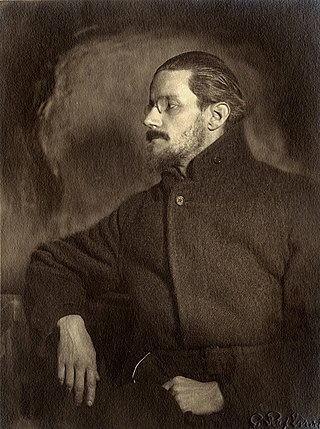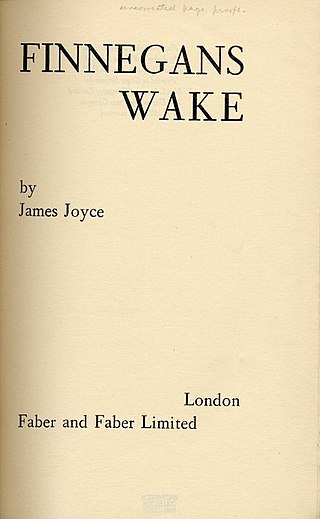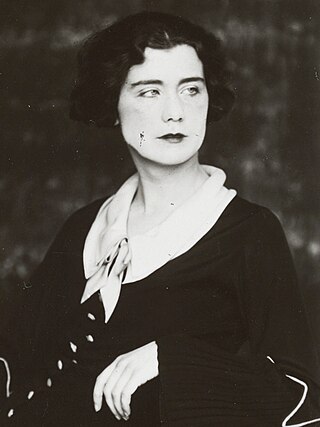
James Augustine Aloysius Joyce was an Irish novelist, poet and literary critic. He contributed to the modernist avant-garde movement and is regarded as one of the most influential and important writers of the 20th century. Joyce's novel Ulysses (1922) is a landmark in which the episodes of Homer's Odyssey are paralleled in a variety of literary styles, particularly stream of consciousness. Other well-known works are the short-story collection Dubliners (1914), and the novels A Portrait of the Artist as a Young Man (1916) and Finnegans Wake (1939). His other writings include three books of poetry, a play, letters, and occasional journalism.

Julia Kristeva is a Bulgarian-French philosopher, literary critic, semiotician, psychoanalyst, feminist, and novelist who has lived in France since the mid-1960s. She has taught at Columbia University, and is now a professor emerita at Université Paris Cité. The author of more than 30 books, including Powers of Horror, Tales of Love, Black Sun: Depression and Melancholia, Proust and the Sense of Time, and the trilogy Female Genius, she has been awarded Commander of the Legion of Honor, Commander of the Order of Merit, the Holberg International Memorial Prize, the Hannah Arendt Prize, and the Vision 97 Foundation Prize, awarded by the Havel Foundation.
Post-structuralism is a philosophical movement that questions the objectivity or stability of the various interpretive structures that are posited by structuralism and considers them to be constituted by broader systems of power. Although post-structuralists all present different critiques of structuralism, common themes among them include the rejection of the self-sufficiency of structuralism, as well as an interrogation of the binary oppositions that constitute its structures. Accordingly, post-structuralism discards the idea of interpreting media within pre-established, socially constructed structures.

Finnegans Wake is a novel by Irish writer James Joyce. It is known for its allusive and experimental style and its reputation as one of the most difficult works in literature. In 1924, it began to appear in installments under the title "fragments from Work in Progress". The final title was only revealed when the book was published on 4 May 1939.
"Finnegan's Wake" is an Irish-American comic folk ballad, first published in New York in 1864. Various 19th-century variety theatre performers, including Dan Bryant of Bryant's Minstrels, claimed authorship but a definitive account of the song's origin has not been established. An earlier popular song, John Brougham's "A Fine Ould Irish Gintleman," also included a verse in which an apparently dead alcoholic was revived by the power of whiskey.

Roland Gérard Barthes was a French literary theorist, essayist, philosopher, critic, and semiotician. His work engaged in the analysis of a variety of sign systems, mainly derived from Western popular culture. His ideas explored a diverse range of fields and influenced the development of many schools of theory, including structuralism, anthropology, literary theory, and post-structuralism.

Jorn Barger is an American blogger, best known as editor of Robot Wisdom, an early weblog. He has written extensively on James Joyce and artificial intelligence, among other subjects; his writing is almost entirely self-published.

Philippe Sollers was a French writer and critic. In 1960 he founded the avant garde literary journal Tel Quel, which was published by Le Seuil and ran until 1982. Sollers then created the journal L'Infini, published first by Denoel, then by Gallimard with Sollers remaining as sole editor.

Lucia Anna Joyce was a British professional dancer and the daughter of Irish writer James Joyce and Nora Barnacle. Once treated by Swiss psychiatrist Carl Jung, Joyce was diagnosed as schizophrenic in the mid-1930s and institutionalized at the Burghölzli psychiatric clinic in Zurich. In 1951, she was transferred to St Andrew's Hospital in Northampton, where she remained until her death in 1982. She was the aunt of Stephen James Joyce.

Sarrasine is a novella written by Honoré de Balzac. It was published in 1830, and is part of his Comédie Humaine.
Barbara Ellen Johnson was an American literary critic and translator, born in Boston. She was a Professor of English and Comparative Literature and the Fredric Wertham Professor of Law and Psychiatry in Society at Harvard University. Her scholarship incorporated a variety of structuralist and poststructuralist perspectives—including deconstruction, Lacanian psychoanalysis, and feminist theory—into a critical, interdisciplinary study of literature. As a scholar, teacher, and translator, Johnson helped make the theories of French philosopher Jacques Derrida accessible to English-speaking audiences in the United States at a time when they had just begun to gain recognition in France. Accordingly, she is often associated with the "Yale School" of academic literary criticism.

Thálatta! Thálatta! or Thálassa! Thálassa! was the cry of joy when the roaming Ten Thousand Greeks saw Euxeinos Pontos from Mount Theches (Θήχης) near Trebizond, after participating in Cyrus the Younger's failed march against the Persian Empire in the year 401 BC. The mountain was only a five-day march away from the friendly coastal city Trapezus. The story is told by Xenophon in his Anabasis. The date of the incident itself is believed to be in the early months of 400 BC.
Petr Skrabanek was a doctor, physician, professor of medicine, and author of several books and many articles. Skrabanek was described by Ben Goldacre as "a lifelong champion of clear thinking, scepticism, and critical appraisal", and expressed vocal criticism of what he dubbed "cacademics", "quackupuncturists" and "nonsensus-consensus". Skrabanek was a polymath, loving jazz, history, literature and playing the piano. He spoke several languages thanks to which he was able to deeply study Joyce's last work - the avant-garde novel Finnegans Wake.
This is a list of works by the English writer Anthony Burgess.
The Ballad of Persse O'Reilly is a song in book one of James Joyce's novel Finnegans Wake, where the protagonist H.C.E. has been brought low by a rumour which begins to spread across Dublin, apparently concerning a sexual trespass involving two girls in Phoenix Park; however details of HCE's transgression change with each retelling of events. Most of chapters 1.2 through 1.4 follow the progress of this rumour, starting with HCE's encounter with "a cad with a pipe." The cad asks the time, but HCE misunderstands it as either an accusation or a proposition, and incriminates himself by denying rumours the cad has not yet heard.

Francisco García Tortosa was a Spanish University Professor, literary critic, and translator into Spanish. In Spain García Tortosa is considered one of the chief experts on the figure and work of the Irish writer, James Joyce, whose creations he has translated and about which he has published a wide range of studies. The Irish hispanist, Ian Gibson, has called García Tortosa «Spain's leading expert on Joyce», while considering his translation of Ulysses, in collaboration with María Luisa Venegas, as «prodigious».

Women is a 1983 novel by French novelist Philippe Sollers. First published in English translation in 1990, Women marked Sollers's move to a more accessible form of fiction writing after a series of difficult experimental texts. The novel was a best-seller in France and attracted attention as a roman à clef that contained recognizable portraits of significant French intellectual figures, such as Louis Althusser, Roland Barthes, Jacques Lacan, and Sollers himself.

Paradis is a 1981 novel by French novelist Philippe Sollers. Sollers conceived the book as a literary homage to Dante's Paradiso. Noted by critics for its lack of punctuation, Paradis has been compared to The Cantos of Ezra Pound and Joyce's Finnegans Wake. Paradis was published in three volumes: Paradis, followed later by Paradis II and Paradis III.
The Waywords and Meansigns Opendoor Edition debuted in 2017 as a part of the Waywords and Meansigns project, setting James Joyce's Finnegans Wake to music. The Opendoor Edition features over 100 artists and musicians performing unabridged passages of Finnegans Wake. An open edition participants are invited to contribute to the Opendoor Edition on an ongoing basis. The edition first premiered on May 4, 2017.












